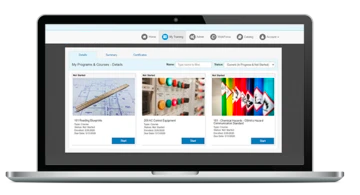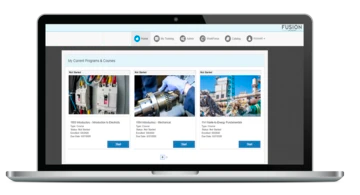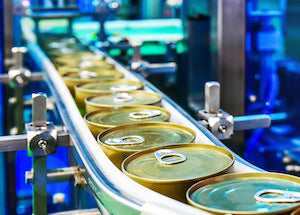Worker shortages in the industrial sector are well-documented.
Between the aging workforce, shortages in talent, insufficient numbers of young workers opting for work in the sector, and commonly used training tactics, it’s hard to keep your maintenance team roster stable – much less with personnel who have the right skills.
These industries have a massive impact on our standards of living in the U.S., and if the industrial sector grinds to a halt, it could impact more than prices at the store or pump. In this article, we’ll review how a comprehensive industrial technical skills training program can have a major, positive impact on these severe worker shortages through upskilling existing team members, enhancing hiring efforts, providing better techniques, and improving knowledge transfer of best practices.
Talent Challenges Companies Must Overcome
According to a survey by the Manufacturing Institute and Deloitte(1), and the Bureau of Labor Statistics(2), we are facing an unprecedent level of worker shortages as the most experienced portion of the industrial workforce reaches retirement age.
-> 75% of executives surveyed believe that worker shortages will have a high or severe impact maintaining or increasing production to meet growing consumer demand
-> In manufacturing alone, 4 million jobs will need to be filled by 2030; 2.1 million of those may go unfilled
Lack of skill directly impacts worker and workplace safety; when your maintenance team has unfilled openings, critical team members have to work faster, with greater pressure, and higher stakes for mistakes. This can often lead to dramatically increased safety risks – for the person completing repairs and those working in the vicinity.
Supply chain challenges are hitting everyone in the wallet. They’re exacerbated by maintenance talent shortages
When your maintenance team can’t keep up with repairs, you may not be able to meet your contractual production requirements. For consumer goods producers, this has a direct impact on the public, and if your company is a supplier, it may halt production at your customers’ facilities, compounding the impacts. The result is higher prices: in our supply-demand oriented economy, the supply chain challenges’ impact to wholesale prices directly hits the budgets of consumers who need those goods.
As more tariffs fall into place, these costs could skyrocket – making your maintenance staff even more important than they were in previous years. The maintenance team’s work directly impacts productivity and personnel costs, arguably making them the most important team you have. They deserve training that empowers them and provides them with a systematic approach to finding root cause, so they learn to complete more efficient and effective repairs.
5 Ways Training Can Help Keep Your Roster Healthy & Facility Running
In short, your maintenance team’s ability to keep up with best practices, troubleshooting, and repair tactics directly impacts your company’s bottom line. The importance of training on your ability to keep your maintenance team staffed and informed shouldn’t be overlooked. Here are 5 ways you can address staffing-related challenges through training:
1. “Hire” from your existing pool of employees. Can’t find new team members? Use training to transform those with an interest in learning to complete maintenance. Providing them the skills and knowledge jump-starts their new roles and puts a focus on safety. Knowledge leads to competence & confidence.
2. Mitigate the personnel shortages by recruiting unskilled workers with technical aptitude and providing foundational maintenance training to those new hires, much like if you’re able to promote from within, to start filling those openings.
3. Increase repair and troubleshooting efficiency, with stronger knowledge and skilled gained through training. This means your team will understand how to find the root cause and repair it, instead of just replacing the same broken part on repeat. After all – that part might go on backorder for much longer than you can do without it, if your suppliers are experiencing worker shortages like you are.
Preventing unplanned downtime with better maintenance, so that when downtime is required, your team can plan for it to be when your facility is otherwise dark.
Keeping up to date with codes and regulations. Standards aren’t changed just to be a pain: they are adopted due to need and based on current best practices and safety requirements. Your team must keep up to date on all relevant standards and codes to ensure your facility runs safely and smoothly – and to help reduce potential citations for poor work or unsafe conditions.
Importance of third-party skills verification
Knowledge transfer is only as good as your source. Every successful maintenance tech relies on a bevy of sources for their knowledge – their predecessors or most experienced coworkers, things they learned online, hacks they’ve figured out over the years. But without a higher level of technical knowledge and experience, it’s hard to tell if every tactic passes muster. What if it isn’t just a bad habit that never caused a problem – yet?
Working with a third-party training provider ensures that training does not perpetuate bad habits. It emphasizes what your team does well, provides insights into improving operations, and makes a measurable impact on skills.
TPC: The training your team needs, when and where they need it
Investing in training isn’t just about filling skill gaps – it’s about creating a more adaptable, efficient, and resilient maintenance team. A well-trained workforce reduces unplanned downtime, mitigates supply chain uncertainties, and ensures new hires are equipped with the right skills.
We recommend that companies needing to improve the maintenance operations plan a comprehensive training program covering all aspects if your maintenance team’s activities. Our expert-backed training programs include best-in-class courses related to electrical, mechanical, HVAC, plant management, and other areas of technical expertise at your facility. Lean on us to train your team with formats that meet each learner where they are, taking their knowledge and skills to the next level:
-Online Training: a flexible solution, fully online and available on most smart devices so your team can train when they have time and start and stop when they need to.
-Training Simulator: TPC Simulations offers foundational skills development through advanced troubleshooting practice in an immersive virtual environment for safe practice and learning a comprehensive troubleshooting process for electrical & HVAC maintenance teams. Understand the cost and time to complete repairs and see improvements over time.
-Instructor-Led Training: an in-depth learning opportunity with seminars led by experts with real-world experience. Learn in person, virtually, or with a small group from your company.
-Jess Schmidt
Data Sources:
1Manufacturing Institute and Deloitte Insights 2023 research report: “Creating pathways for tomorrow's workforce today beyond reskilling in manufacturing.” https://www.themanufac- turinginstitute.org/research/creating-pathways-for-tomorrows-workforce-today-beyond-reskilling-in-manufacturing/
2Bureau of labor statistics, Job Openings and Labor Turnover, July 2023 https://www.bls.gov/news.release/jolts.htm






Comments
Sorry, no comments found for this article